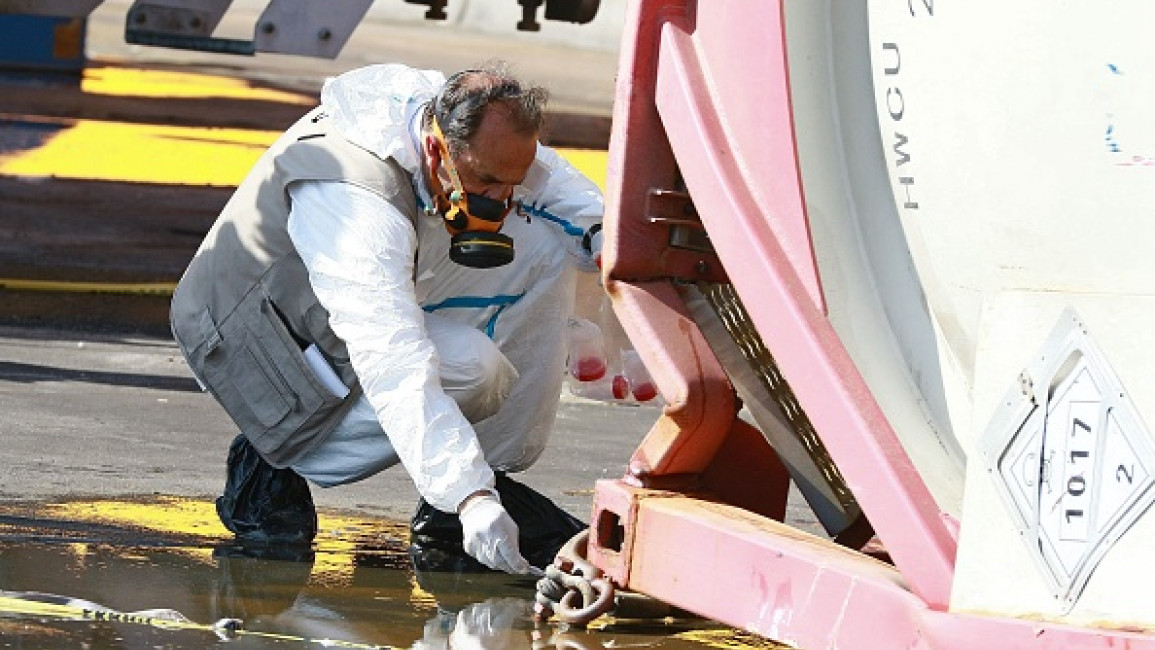Aqaba port workers strike, say company ignored safety concerns
Workers in the Aqaba Port of Jordan went on strike for a fourth day on Thursday, demanding better safety standards after a container of chlorine gas fell on Monday, killing 13 people and hospitalising more than 200.
The container of gas was being loaded onto a ship on Monday afternoon when a rope snapped, causing the container to fall and rupture, releasing a cloud of yellow chlorine gas on nearby workers.
Local hospitals were overwhelmed with patients and the Jordanian governments warned residents in the city of Aqaba to stay inside.
By Tuesday, the gas had dissipated and the government declared the emergency over.
King Abdullah II of Jordan said that a "transparent" investigation would be conducted to determine how the deadly accident occurred.
Workers have refused to go back to work since Monday, saying the working conditions in the port are not safe.
Salah al-Batoush, a press officer with the Union of Port Workers in the Aqaba Port Company, told The New Arab that the strikers would not break until their demands were met.
These included developing better standards when dealing with hazardous materials, replacing old, worn-out equipment, and confining hazardous materials to a special section of the port, al-Batoush said.
The President of the Union, Ahmad al-Mairi, told The New Arab that the union had previously raised concerns about safety to the Aqaba Port Company (APC), but said their concerns went unaddressed.
The New Arab contacted the general manager of the APC and the company itself for a comment, but did not receive a response by the time of publication.
Al-Mairi further added that he had been "expecting" an incident such as Monday's to happen due to old equipment and a lack of adequate training for staff at the port.
"What happened [on Monday] hurts our hearts and hurts all of Jordan, and we mourn our colleagues as martyrs. But we are moving forward to ensure that next time it will be impossible for our workers’ lives to be in danger," he said.
Another Aqaba port worker told The New Arab that he was furious over what they saw as a foreseeable disaster.
They claimed that experienced workers had been dismissed and replaced by younger workers without the proper training, creating a hazardous work environment.
"We told [the port administration] more than once that the equipment needed maintenance, but they ignored us," the worker who spoke under condition of anonymity fearing reprisals by their employer alleged.
Another striking port worker, in addition to a relative of two who died, also told The New Arab that the APC had been made aware of workers' safety concerns prior to Monday's gas leak.
"Our demand is a level of general safety, the safety we have now is horrendous," the striking worker said under the condition of anonymity.
The Jordanian government has said that its investigation has entered "advanced stages" but had not yet given an explanation for Monday's accident.
The union head, Al-Marai, claimed that no one from the APC or Jordanian government had reached out to the union as of the time of publishing.
The scene of Monday's gas leak was horrifying, the workers and medics said. As workers' fled from the deadly chlorine gas and ambulances brought in the injured, local hospitals quickly got overwhelmed.
"One ambulance arrived carrying eight patients. Then just a few minutes later another ambulance came with eight more. Soon we had 85 patients on oxygen, all of the tanks were occupied," Osamah al-Bustanji, a 27-year-old emergency doctor in the Islamic Jordanian Hospital of Aqaba, told The New Arab.
The hospital soon had to close its doors, with the emergency room and the ICU fully occupied by patients suffering from chlorine exposure. One patient out of the 85 they received died.
Chlorine gas, a highly dangerous substance infamously used as a chemical weapon recently in Syria by the Assad regime, can cause respiratory issues and death depending on the exposure.
"We were all crying. We had exited the boundaries of medical protocols, it was a matter of life and death. It was like a nightmare," al-Bustanji said.
"Everyone was helping. The administrators, the accountants and even the parking attendant was helping in this situation," he added.
Al-Marayet, the port worker present at the scene during the accident, said he had just seconds to think before fleeing the area.
"There was just seconds, you couldn't remain there and think. I just thought of helping people by putting them in my car," al-Marayet said. He grabbed two of his coworkers and put them in his vehicle and immediately drove from the scene.
All three of them had symptoms of exposure, but were able to recover once treated at a nearby hospital.



